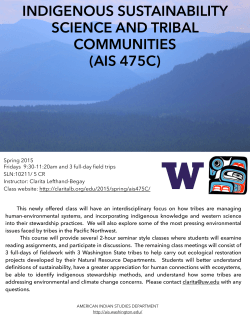
brochure here - Centre of Malaysian Indigenous Studies
REGISTRATION FEES SECRETARIAT Local Students: RM 150.00 Local participants: Early Bird: RM400.00 Normal rate: RM 500.00 Centre of Malaysian Indigenous Studies Level 4, Wisma R & D University of Malaya Jalan Pantai Baharu International participants: 59990 Kuala Lumpur Early bird :USD 150 Normal rate: USD200 Tel: 603-2246 3244 (Radzi/ Elena) Faks: 603 2245 3245 Email: umindigenousconf2015@gmail.com (This fee covers conference materials, or lunches, tea and coffee breaks) The Faculty of Law, University of Malaya Early bird deadline: 15 March 2015 University of Malaya, 50603 Kuala Lumpur PAYMENT DETAILS Tel: 7967 6575 (Norfazliana Diana) Account details: Universiti Malaya For more information please see : CIMB Bank 1440000-4005-053 http://cmis.um.edu.my or Swift code: CIBBMYKL http://law.um.edu.my/ Scan a copy of your TT and email to the Secretariat at umindigenousconf2015@gmail.com International Conference on Access to Justice for Indigenous Peoples Realisation of an Inclusive & Integrated Human Rights Approach Date: 9 9-11 April 2015 Venue: Faculty of Law, University of Malaya, Kuala Lumpur REGISTRATION FORM Title/designation Name Organisation/Institution Address Telephone/mobile Email Method of payment Telegraphic Transfer (TT) Local Order Bank Draft/postal order Muzeum/OA Village visit Signature For more information or enquiries, contact the Secretariat at umindigenousconf2015@gmail.com Yes No Date Jointly organized by Centre for Malaysian Indigenous Studies & Faculty of Law, University of Malaya ABOUT THE SEMINAR Access to justice involves more than the administration of justice through the courts. It includes informal mechanisms to provide people with a sense of “justice” in various contexts and calls for respect and treatment of peoples with equal dignity, including proper consultation on matters pertaining to rights of affected peoples. Many indigenous peoples have suffered various forms of historical injustices and continue to face challenges to recognition of their rights. Recognising this, the United Nations Declaration on the Rights of Indigenous Peoples provide that respect for their rights involves recognising their rights to maintain control and connection to their lands, territories and forests, to strengthen indigenous juridical systems, their social, economic and cultural institutions, their rights to maintain their language, cultural heritage, customs, traditional knowledge, and rights of women in the community. As they cope with modern living, this involves giving them equal rights to critical health care and education. As indigenous peoples’ rights are both individual and collective in nature, indigenous peoples remain committed to their struggles and their culture continues to be vibrant while their traditional knowledge is a source of invaluable ingenuity. This helps to better understand their traditional knowledge is a source of invaluable ingenuity. This helps to better understand their traditional values which can help to inform formulation of national strategies, policies and laws, as well as the moulding of equitable remedies. OBJECTIVE OF THE CONFERENCE To provide a platform for academic forum by bringing together researchers, individuals and persons whose scholarly work involves indigenous peoples, to discuss issues concerning access to justice for indigenous communities. To explore avenues for full and effective participation of indigenous communities in various decision making institutions related to their rights and furtherance of their self determination in all spheres. To discuss an inclusive and integrated human rights based approach which is critical to solving various issues between states and indigenous communities. PANELS/ SUB-THEMES CALL FOR PAPERS Papers may be submitted under the following Academics, lawyers, policy makers and government officers, NGO representatives or other related headings: are invited to contribute papers at this Indigenous peoples jurisprudential ap- conference. Authors are invited to submit an abstract of not more than 250 words. It proach to justice and its attainment. should include the title, the author and Business, human rights and indigenous contact details with keywords. All abstracts must be submitted electronically as a Word peoples document, attachment to the organizers at Indigenous governance, institutions, umindigenousconf2015@gmail.com. conflict resolution and restorative justice Abstracts and full papers are to be Times Environmental justice and sustainability New Roman 12’, at least 1.5 spacing. Please of equitable socio economic develop- indicate your preferred panel. Paper presenters are required to send in a full ment paper prior to the conference. Forest laws, governance and trade and community rights Selected papers will be considered for publication in the Journal of Malaysian and Comparative Law (a peer reviewed journal) or ICT and indigenous communities as a chapter in a book published by UM Wellness, social welfare and health is- Press. sues in indigenous communities Free Prior and Informed Consent Indigenous peoples and community DEADLINES management of forests Abstract submission: 11/2/2015 Indigenous women's access to justice Acceptance notification by email: Language and education 25/2/2015 Protection of ancestral lands, territories Paper submission: 25/3/2015 and resources Self-determination and indigenous iden- Visit to Museum Orang Asli, Batu 12, Gomtity bak, Selangor. Traditional knowledge, cultural heritage There will be a visit to the Museum Orang Asli and benefit sharing on the last day of the seminar. Please indicate whether you will be coming as places are limited. First come first serve basis.
© Copyright 2025










